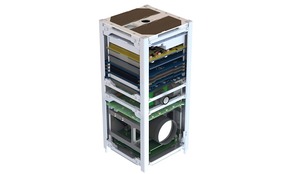More than two years since its formation and Asgardia continues to make significant progress on both the political and financial fronts. Representatives of the new space nation gave presentations in Davos, Switzerland, in January, and the start of 2019 also saw Parliament’s second digital sitting. Here, Asgardia’s Chair of Parliament, Lembit Öpik explains how a cross-section of people and countries of the world are working together to create a functioning political system and Leon Shpilsky, Minister of Finance for Asgardia, highlights its evolving economic status.
In the 13 years that I served as an MP in the United Kingdom I never came across a group of politicians as collectively focused as the politicians of Asgardia - the world’s first ‘space nation’.
Asgardia has achieved a series of path-finding records in its progress towards establishing a fully operational parliamentary and governmental system. In doing so, it has faced two primary challenges: first, creating a political structure that can operate across the colossal distances involved for a space-based nation; and, second, creating a political system which defaults to stability under stress.
There is no template for this - at least no attractive one. Terrestrial empires of the past frequently maintained stability by relying on military might and oppression. These could be effective - for a time. However, even leaving aside the moral aspects of such tactics, both force and coercion eventually had a corrosive effect on the integrity of the empires they were supposed to protect.
Asgardia has achieved a series of pathfinding records in its progress towards establishing a fully operational parliamentary and governmental system
This is not how Asgardia wants to do things. If a nation is under pressure, it will react unpredictably and this instability sometimes leads to chaos and war. Asgardia is doing its best to avoid those gloomy scenarios, not least because star wars (outside the movies) are to be avoided at all costs.
Over the last year I’ve been working with Asgardia’s Members of Parliament (AMPs) to generate protocols and precedents which form the basis of a political system and civic society.

In line with the virtual environment first established in October 2018, Asgardia’s Parliament held its second digital sitting from 10-12 January 2019. Digital sittings involve the bringing together of a large number of representatives - living across the globe - into a single Parliamentary event, using the medium of remote conferencing. It’s something Asgardia has to do well because it is a certainty that this will be the only method which will work once there are permanent space habitations to include as well.
The first digital sitting was successful from a technical point of view. Asgardia had no example to follow for such an event, so we did our best to draw on existing practice for remote conferencing, and then overlaid the political structure onto that. The second sitting built on what we’d learned first time round and reflected some procedural improvements, as well as growing experience of the Parliamentarians themselves.
Some major decisions were made at this sitting. Extensive negotiations had taken place between AMPs and those proposing Asgardia’s first budget. As a result, the original proposal was amended substantially, reflecting the wishes of AMPs, and showing the extent to which the political system is becoming a more collegiate environment where politicians work together to improve legislation, rather than being faced with a simple ‘take it or leave it’ option.
Our January 2019 sitting also covered some important aspects of the formation of the Government. Again, AMPs’ suggestions added considerable value to the democratic arrangements in place. Parliament approved the first six Asgardian ministers, meaning that, together with the Prime Minister, a large proportion of the ministerial team is now working. With the activation of the committees in Parliament, the core framework for the political system is in place.
Incidentally, four committees reported on their work too, indicating that AMPs are taking their duties seriously. The commitment to getting things moving has, to an extent, been happening organically.
We also had our first Prime Minister’s Questions, with Ana Mercedes Diaz engaging with AMPs, presenting her perspective on where we have reached in terms of the formation of the Government and on other matters. She also responded to questions from Parliamentarians.
From a technical viewpoint, the three-day event was remarkably successful. To be online with around 100 other contributors for over seven hours at a time can mean that, in 2019, the system could still easily become ‘unstable’. But it didn’t.
It’s not all been plain sailing. Because we’re human we have disputes and tensions. But the test of a political system is whether these pressures weaken or strengthen the Parliamentary process. And, on the whole, I think it’s adding strength to be able to debate, disagree, decide and move on.
Timing challenges
As part of this maturing process, I’ve also had to deal with some interesting issues. For example, at what time should the sessions occur? A flat Earth would be an advantage here, because we’d all be in the same time zone. Instead, I had to work out the best time for the majority of individuals to be inconvenienced for the minimum amount of time. At the first sitting, we moved times around to ensure all zones had periods of ‘normal’ daytime for the sessions, and a fair share of ‘unsociable’ hours too. In January we held sittings at the same time each day. It led to an even higher attendance, far above the quorum.
When we inhabit space on other heavenly bodies the timing situation is even more complex. As well as planning around convenient times for waking and sleeping for those in orbit, or on other moons and planets, we’ll have the additional challenge of having to deal with transmission times which amount to minutes, hours, days or even years. Based on my experience with Asgardia, and having thought about these technical limitations, I believe these time delays will be one of the single biggest factors to be addressed and planned for.
Another aspect of the process which requires expertise and experience is management of the debates themselves, to make sure that everyone is treated equitably in the discussions. Achieving this is part art and part science. We’ve done well so far.

Cosmic habitation
Let’s finish with a look at the policies that were approved. A landmark development was that Parliament approved Asgardia’s first budget - a giant leap for Asgardia and for humankind because what this nation does with its money will have relevance for centuries to come and it provides the basis for a sustainable financial arrangement for cosmic habitation by the human race. With the advance of the Ministerial team we also have the prospect of a big increase in specific activity in policy areas too.
Under the influence of Earth’s gravitational pull and its politics, we easily forget the philosophical gravity of the situation: namely, that we’re doing all this to push forward with humanity’s next essential step into the cosmos.
Our AMPs haven’t forgotten. Many meet weekly, and in some cases daily, to make progress on everything from Asgardia’s foreign affairs to citizenship of the planet’s newest nation.
The next digital sitting is scheduled for April 2019 and some further important decisions will be made there. Then, there’s a key Asgardia Science Convention in June 2019, and that will help us set course for the destination that Asgardia was set up to deliver - the permanent habitation of space.
My immediate ‘external’ next step as Chair of Parliament is to build more links with other parliaments, and reach out on behalf of Asgardia to make the right connections. That will help ensure space is open to the many, not just an elite few. We’re already in the process of bilateral dialogue and I’ll have more to say about that in the future.
There’s sometimes an impatience with getting things done. Could we do all this faster? Taking steps that are too big introduces the risk of stumbling and falling. The Head of Nation, Dr Igor Ashurbeyli, knows this and has succeeded in bringing together a community of individuals with a shared and consistent interest in getting Asgardia right - and at the right speed.
With Asgardia’s increasing status as the only nation that’s trying to open the cosmos to all humankind, I’d say we’re going to be making rather a lot of friends in the immediate future. I invite you, as an individual, to join us too. If you’d like to play your part in humanity’s cosmic history, this might be a good time to become an Asgardian (www.asgardia.space).
 Asgardia’s Minister of Finance Leon Shpilsky provided delegates with a detailed presentation which focused on Asgardia’s networking cooperation and digital economy.
Asgardia’s Minister of Finance Leon Shpilsky provided delegates with a detailed presentation which focused on Asgardia’s networking cooperation and digital economy.
Lembit Öpik
What this nation does with its money will have relevance for centuries to come and it provides the basis for a sustainable financial arrangement for cosmic habitation
Asgardia is the only nation focused on networking cooperation and digital economy. It is a digital society connecting people who either already conduct their economic affairs both in the digital and non-digital formats, or plan to in the near future.
Our Government proposed and our Parliament has adopted - in the first reading during the session in January 2019 - the Act of National Currency and Basic Economic Principals of Asgardia. Its main principles are summarised as follows:
- Only citizens of Asgardia, not the Government, have control over supply of the national currency (Solar) of Asgardia
- The citizens of Asgardia will directly participate in profits received by the Government as dividends from various business enterprises conducted by the Nation directly or through entities controlled by it
- Emission of Solars is regulated strictly by open international currency markets and will depend solely on real demand for goods and services for which Solars would be accepted as a form of payment.
Annual budgets of Asgardia are formed based on projected revenues to be funded through the collection of:
a) annual citizenship fees, which in 2019 are set at EUR 100 per citizen
b) a reasonable flat tax system applied to net profits of business enterprises registered in Asgardia jurisdiction, provided the same profits are not taxed anywhere on Earth (so double taxation is avoided)
c) various duties on standard services provided by the Government of Asgardia
d) reasonable commission on transactions conducted in Solars, as well as on its conversion into and from 12 designated currencies which were recently democratically selected by Asgardians as Solar conversion currencies
e) a percentage of value of business transactions conducted within Asgardia jurisdiction
f) dividends received by the Government from its business enterprises and entities
g) other miscellaneous sources.

Revenue and expenditure
A significant portion of Government revenues will be derived from dividends to be received from major global infrastructure projects - as well as investment activities - for which purpose a holding company (Asgardia AG - a corporation registered in Austria) has been established.
With respect to budgetary expenditures, it is important to underscore a unique difference between the economic system of Asgardia and other Earth economies. In the Asgardia budget there is no need to provide for expenditures related to such line items as road construction or maintenance, agricultural complex, military upkeep and defence industry, security and protection of national borders, and many other items not necessary in a nation based purely on a digital economy.
This provides Asgardia with the ability to concentrate all of its budgetary burdens exclusively on issues connected to space exploration, and the development and achievement of Asgardia’s main objectives which should, in turn, guarantee unique preferences over all nations on Earth and ensure high confidence of achievability of positive results.
One example of a planned Asgardia global infrastructure project involves the launch of 10,000 satellites with the objective of creating a Global Satellite Internet Network
Equity capital
For the main holding company Asgardia AG we intend to set equity capital of the company at EUR 15 billion, allocated between individual common shares with a nominal value of EUR 1000 each at the first capital raise.
Share ownership privileges (of second level) will be assigned to the first seven million citizens of Asgardia (‘first wave’), who will receive citizenship in Asgardia and then be allowed to purchase for a projected price of EUR 1000 each one Asgardia Citizenship Certificate - which in itself will become freely tradable paper - and one Asgardia passport.
The Government will use EUR 7 billion collected from sale of Asgardia Certificates of Citizenship to acquire seven million common shares of Asgardia AG. Any dividends to be received by the Nation will, at least partially, be distributed by the Parliament of Asgardia directly to the citizens of Asgardia, which corresponds and proves a major basic economic principal of the Nation regarding participation of its citizens in profits of the Nation.
 Nikitina-Hefliger (right), Chair of Asgardia’s Culture Committee and the president of the Musical Olympus Foundation, spoke during the cultural session at the Caspian Week Conference in Davos, Switzerland. Afterwards she stated that such forums and congresses contribute to the popularisation of Asgardia and provide a platform where politics and business come together.
Nikitina-Hefliger (right), Chair of Asgardia’s Culture Committee and the president of the Musical Olympus Foundation, spoke during the cultural session at the Caspian Week Conference in Davos, Switzerland. Afterwards she stated that such forums and congresses contribute to the popularisation of Asgardia and provide a platform where politics and business come together.
Furthermore, out of the first seven million citizens, one million will receive options to directly acquire one common share each in Asgardia AG, resulting in additional capital investment into Asgardia AG in the sum of EUR 1 billion. In effect, the first one million citizens will, therefore, receive Asgardia AG share ownership privileges of First Level, i.e. the right to acquire and own common shares in and receive dividends from Asgardia AG directly as opposed to through the Nation’s budget surplus allocation.
Finally, Asgardia AG share ownership privileges of the highest level will be assigned to seven global investors, or representatives of their respective investment funds/pools, which will invest EUR 1 billion each into Asgardia AG.
These investors - proportionate to their investment allocations of ownership, control and dividend distributions in Asgardia AG - will be admitted, along with the Chairman of Parliament of Asgardia, the Prime Minister of Asgardia, the Head of Administration of Asgardia, the Chief Justice of Asgardia, the Chief Prosecutor of Asgardia, and the Chief Auditor of Asgardia, as full members of the Supreme Space Council of Asgardia to be headed by the Head of Nation of Asgardia.
The remaining 143 million citizens of Asgardia (‘second wave’), from the overall number of Asgardia citizens limited to 150 million people, will be allowed - along with other independent investors- to directly invest and participate in ownership of various special projects of Asgardia AG at a level lower than the global infrastructure level.
One example of a planned Asgardia global infrastructure project involves the launch of 10,000 satellites with the objective of creating a Global Satellite Internet Network for the purpose of transmission of signals and establishment of communication channels - utilising Asgardia’s own IP - between people and without any use of radio frequencies on Earth.
Leon Shpilsky
About the authors
Lembit Öpik became Chairman of the Parliament of Asgardia, the Space Nation in June 2018. He is a former British politician and member of the Liberal Democrats, serving as a member of parliament (MP) for the constituency of Montgomeryshire in Wales from 1997 until 2010. He was the leader of the Welsh Liberal Democrats from 2001 to 2007. He was educated at the Royal Belfast Academical Institution before going on to the University of Bristol, where he completed a degree in philosophy.
Leon Shpilsky is Finance Minister and CEO of Asgardia AG. He most recently served as the Principal/Head of Corporate Development at Oxford Sciences Innovation Ltd, in Oxford, UK. He is a graduate of the University of Southern California in Los Angeles with a BS in Business Administration. With more than 30 years of professional consulting experience, he has worked on investment banking deals, as well as in capital raises, international investment into high tech and innovation projects, and the expansion of businesses internationally.














